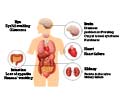An ‘obesity pill’ that can block the effects of high sugar and high fat diets could be closer to reality.

"This important new finding links obesity and high fat high sugar diets with changes in immune cells and inflammatory status, highlighting an emerging realization that obesity is an inflammatory disease," said David P. Fairlie, Ph.D., study author from the Institute for Molecular Bioscience at the University of Queensland, in Bribane, Australia. "Drugs designed to block certain inflammatory proteins, as in this report, may be able to prevent and treat obesity, which in turn is a major risk factor for type 2 diabetes, heart disease, stroke, kidney failure, limb amputation, and cancers."
To make this discovery, Fairlie and colleagues discovered the first potent, selective and orally bioavailable small molecule antagonists of PAR2 and characterized their functional responses in inflammatory cellular and animal models. They found that PAR2 expression is increased in vivo in adipose tissue from obese humans and rats, stimulated in vitro in human macrophages by the dietary fatty acid palmitic acid, and inhibited in vivo and in vitro by a PAR2 antagonist. This antagonist was then used as a tool to dissect roles for PAR2 activation in mediating metabolic dysfunction in human monocyte-derived macrophages (HMDM), human and rodent adipocytes, and diet-induced obesity in rats. Oral treatment of diet-induced obese rats attenuated PAR2 signaling in adipose tissue and inhibited adipose inflammation, insulin resistance, diet-induced obesity and cardiovascular abnormalities. This is the first report that a PAR2 antagonist improves obesity, glucose homeostasis and obesity-associated chronic inflammation in vivo. These findings indicate that increased PAR2 expression may be a valuable new biomarker for metabolic dysfunction and further, that PAR2 antagonism can be an effective intervention for treating metabolic dysfunction and obesity.
"We know that that eating too much and not exercising enough makes you overweight, and then obese, but why? The bottom line of this report is that obesity is an inflammatory disease, and inflammation plays a greater role in the downward spiral to obesity than most people realize." said Gerald Weissmann, M.D., Editor-in-Chief of The FASEB Journal. "It appears that once we can control the inflammation, we can begin to get everything else in line. Fortunately, these scientists have already identified one promising compound that seems to work."
Source-Eurekalert
 MEDINDIA
MEDINDIA




 Email
Email









